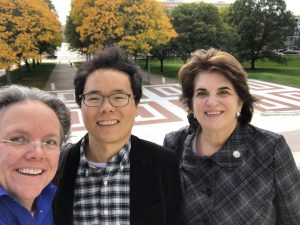
Associate Professor Elizabeth Dugan, far left, and Professor Nina Silverstein, far right, with Postdoctoral Fellow ChaeMan (Jay) Lee.
Researchers at the University of Massachusetts Boston have prepared a detailed new study of the state’s transportation options to older residents, examining the need for services and available resources.
The report by researchers from the McCormack Graduate School’s Gerontology Institute was delivered to a workgroup dedicated to transportation on the Governor’s Council to Address Aging Issues in Massachusetts. It was produced with the financial support of the Tufts Health Plan Foundation.
“This applied research aims to answer practical, real world questions to inform state policy,” said associate professor Elizabeth Dugan, who led the research team.
“The results of our study show where we have transportation options for older people and where we don’t,” she said. “By pinpointing areas of need and gaps we can help policymakers to allocate resources as needed.”
The scan provides a comprehensive look at transportation resources in every Massachusetts community. It also highlights many of the best transportation practices for older adults across the country.
The report identifies relatively low levels of medical transportation services for older Massachusetts residents on a per capita basis and finds ample room for growth in the sector. It also examines non-medical “quality of life” transportation resources, calling it another area of potential growth and innovation.
Transportation services available during weekends and at night, a need identified in interviews with regional transit authority leaders and stakeholders, are reported for every town in the state.
The scan looked at senior populations in 26 “gateway” cities that anchor regional economies across the state. It also focused on Massachusetts communities that may be transportation “deserts,” based on performance scores, a lack of service that could affect both residents and people who work in those cities and towns.
Older residents require different kinds of transportation assistance. Though age itself is only one factor in determining transportation needs, the scan compared community-by-community service performance scores with local populations aged 65-74, 75-84 and 85 and older.
“Building a commonwealth that is a great place to grow up and grow old in means have transportation options,” said Dugan. “This scan is one tool that helps in that work. Our research team is proud to serve the Governor’s Council to Address Aging Issues.”
The report also examined other transportation services across the country, identifying innovative and particularly effective resources serving older travelers.
It found that no single level of service was appropriate for all older people and that coordination was key in weaving together a strong net of options.
“My take-away from talking to colleagues in other states is that a comprehensive statewide plan is needed to address a full range of mobility needs of older people in the commonwealth, from active travel to supporting transportation,” said Professor Nina Silverstein, a co-author of the report.
The report was released June 19 to the members of the Governor’s Council and will inform the next phase of work. It is available on the Massachusetts Healthy Aging Collaborative website .
The Gerontology Institute team included Dugan, Silverstein, Postdoctoral Fellow ShuangShuang Wang, and graduate gerontology student research assistants Bon Kim, Natalie Pitheckoff, Shiva Prisad, Kunyu Zhang, and Kusum Jasuja. Additional assistance was provided by Postdoctoral Fellow ChaeMan (Jay) Lee.

March 8, 2021 at 11:13 am
exam bank
I’m happy I located this blog! From time to time, students want to cognitive the keys of productive literary essays composing. Your first-class knowledge about this good post can become a proper basis for such people.
March 19, 2021 at 11:42 am
in stream advertisement
Incredible posting this is from you. I am really and truly thrilled to read this marvelous post. You’ve really impressed me today. I hope you’ll continue to do so!